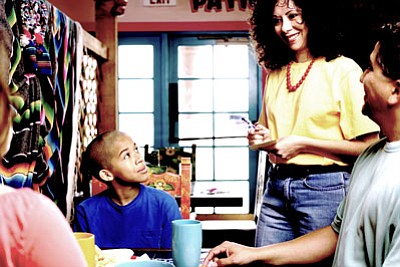BALTIMORE — We’ve all heard that old familiar phrase from our parents, “Do as I say, and not as I do.” We may have even used it a few times with our own children. If you think about what we are saying to our children, what message are we really giving them?
Basically, we are saying do not learn by my example. Don’t hold me to a high standard of behavior. It doesn’t matter how I treat others as long as you follow my directive. I don’t really care about how I am perceived as long as you just listen to my rules of conduct.
We are telling our children that although we might not treat others with respect and kindness, they should. We are telling our children that although we act like a bully or go on a tirade when things don’t go our way, they should not. We are telling our children that although we are really angry and nasty when we lose a game, they need to be good sports and be a team player. We are telling our children that good behavior is not important enough for us to exhibit it, just something they should do because we say so.
I often tell my two girls, when you start dating (after 40 hopefully!) it’s important for you to be with someone who is respectful to everyone. When you go out to a restaurant, see how they treat the staff. If they are rude, dismissive or
unkind to a waiter or waitress, they will one day be unkind to you. Showing disrespect, especially towards someone who is trying to help them, is more than telling. A person who does these things is likely someone who feels superior to others, someone who most likely was a schoolyard bully at one point in their life, and will remain that way unless something dramatic happens to change them otherwise.
What do we do now as parents who want our children to grow up to be kind, caring, and empathetic individuals? We start by being one.
We can’t expect our children to be considerate and caring of others, if they don’t have an example of someone to emulate. Children are smart. If mom or dad doesn’t act kindly towards someone, they don’t feel the need to either. In fact, when children see a parent acting like a bully, they may in fact want to show dad or mom that they too can be nasty and forceful. Children love the approval of their parents. They may feel that their father or mother will be proud of them if they emulate their parents’ behaviors.
While there are some exceptions, such as a child having a medical reason for struggling with empathetic behaviors, when children see their parents being a team player, being kind to others, showing empathy and embracing the diversities of others, they too will want to please their parents by acting in much the same way. And if you find your child taunting another child or being mean to someone else, address it immediately! If you child is very young, use puppets or dolls to roll play situations. Ask your child how they think the other child, who is being taunted, feels. Ask them how they would feel if someone was being hurtful to them.
If a child is older, sit down with them and let them know that you are not proud of their behavior. Tell them that you won’t tolerate it and will impose consequences if that behavior continues. The consequences should be something meaningful. For example, have them volunteer at a local charity for a few hours. Have them come up with their own community project to spearhead. Let them work with you to clean out closets and donate unneeded items to a group they feel excited about. Show them that you care about others and care about how other people are treated. And finally, catch your children being good. When they are acting nicely, when they are doing something kind, let them know how great that makes you feel and how proud you are of them.
Danielle Lindner is an author, educator and founder of The London Day School. She is the creator of Miss Danielle’s Preschoolbuds® Books and TV Series which can be seen on Amazon.com and on her YouTube Channel.
